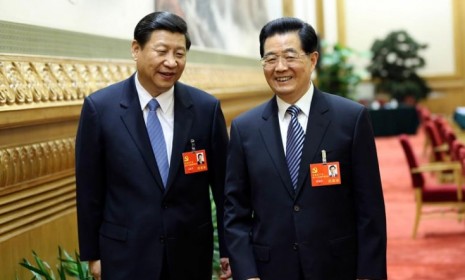Everything you need to know about China's new leaders
Beijing is initiating a once-in-a-decade transfer of power to a new generation of top officials. But will anything really change?

A free daily email with the biggest news stories of the day – and the best features from TheWeek.com
You are now subscribed
Your newsletter sign-up was successful
China's ruling Communist Party opened its week-long 18th National Congress on Thursday, launching a carefully choreographed, five-month process that will transfer power from President Hu Jintao and other top officials to a new generation of leaders. To kick off the meeting, Hu delivered a 90-minute speech in which he urged his colleagues to stamp out corruption, which has triggered public anger at the government. "Nobody is above the law," Hu told the 2,309 delegates and party notables. "If we fail to handle this issue well, it could prove fatal to the party." Here's what you should know:
Why is China replacing its leaders now?
Hu has been in power for a decade, and there is supposed to be a transfer of power every 10 years. Of course, it doesn't always work out that way — this would be only the second orderly transition in 63 years of communist rule. China's citizens are watching the process closely because they believe China is at a crossroads where it needs leaders who are open to new ideas, greater transparency, and accountability — or even some measure of democracy — to get the slowing economy moving again.
The Week
Escape your echo chamber. Get the facts behind the news, plus analysis from multiple perspectives.

Sign up for The Week's Free Newsletters
From our morning news briefing to a weekly Good News Newsletter, get the best of The Week delivered directly to your inbox.
From our morning news briefing to a weekly Good News Newsletter, get the best of The Week delivered directly to your inbox.
Who will the new leaders be?
There's little mystery about the person in line to replace Hu. Vice President Xi Jinping was anointed as Hu's successor years ago, so he's expected to step in as the party's secretary general when Hu steps aside next week. Xi will also become president, and another known quantity, Li Keqiang, is expected to be his prime minister. The question is who will be picked to fill the remaining five to seven seats on the Politburo Standing Committee, which makes the country's major policy decisions. Xi won't get to handpick the other members of the committee, so it's anybody's guess how much control he'll have over them when he starts the job.
When will we know who the other members are?
Next Thursday, the day after the congress closes, Xi and Li will appear publicly for the first time with the remaining members of the committee. Between now and then, there will be a lot of back-room wrangling. Hu is working behind the scenes to pack the ruling committee with as many of his allies as possible. His nemeses, including his predecessor Jiang Zemin (who has supported Xi), are also angling to get spots on the committee for their own allies.
A free daily email with the biggest news stories of the day – and the best features from TheWeek.com
What challenges will the new leaders face?
They'll have their hands full. China is spending a fortune on domestic security, with a reported 180,000 "mass incidents" in 2010, and popular unrest will only get worse without visible reforms. Without changes to increase social equality and shift the country's economic strategy from a reliance on exports to boosting household consumption at home, economists believe China's growth will hit a wall.
Will the new leaders bring change to China?
Not if the old leaders have anything to say about it. Many people in China were hoping that a wave of scandals this year would force the party chiefs to embrace real reform and a newfound openness (Bloomberg News reported in June that Xi's extended family had amassed a $300 million fortune; The New York Times said recently that the family of Prime Minister Wen Jiabao controlled a $2.7 billion fortune). There are plenty of signs the public isn't pleased. Before the congress opened, 130 dissidents were arrested and six Tibetans set themselves on fire to protest Chinese rule of Tibetan areas. Still, despite Hu's nod to the corruption that weakened him, the outgoing leader told delegates the party wouldn't take the "erroneous path of changing the banner." In other words, says Peking University political scientist Zhang Jian, forget reform, because "we are not going to change; we are going to stay where we are."
Sources: Associated Press, Foreign Policy, GlobalPost, Guardian, Washington Post
-
 How the FCC’s ‘equal time’ rule works
How the FCC’s ‘equal time’ rule worksIn the Spotlight The law is at the heart of the Colbert-CBS conflict
-
 What is the endgame in the DHS shutdown?
What is the endgame in the DHS shutdown?Today’s Big Question Democrats want to rein in ICE’s immigration crackdown
-
 ‘Poor time management isn’t just an inconvenience’
‘Poor time management isn’t just an inconvenience’Instant Opinion Opinion, comment and editorials of the day